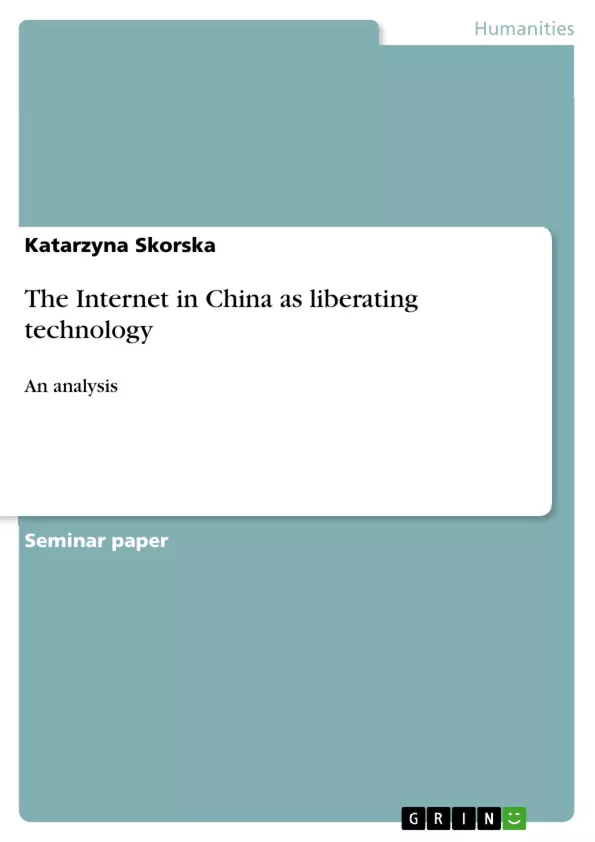China joined the Internet in 1994 year, becoming the earliest country to mark this achievement in Asia, but in the world taking 71th place registering to the global network. Use of the Internet in China has dramatically changed- from 22 million users in 2000 to 854 millions in 2020. That makes every second citizen in China (59,3% precisely) being on the Internet. In 2021 the
percentage of the Chinese population on the Web skyrocketed to 70% with 1,01 billion users.
In this essay I argue that the advent of the Internet in China is not liberating in both two dimensions: outside of the Internet (referring to the digital divide) and on the Internet (for netizens). Moreover, Virtual China rather resembles an endless mouse-and-cat game. With mouse being the official authorities and cat chinese netizens. Although it could have a liberating potential,
it is not very effective. On the other hand, it also contributes to social inequalities, as not every citizen has access to the Internet or simply the will (as in the case of elderly group) to actively use it. This all deepens social tensions, which are destructive for the mass mobilization that is so much needed in the fight for democracy. The battlefield for the and on Internet counties endlessly without the clear winner. As soon as one side of the duvet (Internet) is trying to pull into one’s direction, the other side responds instantly pulling into one's side.
For the authorities, the Internet is being implemented as an instrument of digital authoritarianism. Chinese netizens however recognize in the Internet the potential of liberating technology. They are proactively trying to make use of its own needs, by online protests, posts and comments that criticize, mock and satirize the ruling power. They do it as long as they are not being caught by online censors or outside of the Web by officers and judicial authorities.
Inhaltsverzeichnis (Table of Contents)
- Introduction
- Literature review
- China's political system and governance
- digital authoritarianism
- Virtual China
- Internet censorship
- friction and flooding
- self-censorship and censorship by private institutions
- blogger culture
- blogosphere in Xinjiang
- "picking quarrels and provoking troubles"
- Chinese netizens as the “new opinion class”
- mass mobilization
- Internet censorship
- Digital Divide
Zielsetzung und Themenschwerpunkte (Objectives and Key Themes)
This essay examines the impact of the internet on China's democratization prospects. It analyzes the relationship between the internet and political freedom in China, exploring the concept of "digital authoritarianism" and the role of online censorship. The essay also investigates the role of Chinese netizens in shaping online discourse and their potential for mass mobilization.
- The internet's potential to facilitate democratization in China
- The role of digital authoritarianism in shaping online discourse
- The dynamics of censorship and self-censorship in China's online environment
- The emergence of a "new opinion class" and its impact on political engagement
- The influence of the digital divide on access to information and political participation
Zusammenfassung der Kapitel (Chapter Summaries)
- Introduction: This chapter introduces the essay's central question - whether the internet has contributed to democratization in China. It explores contrasting perspectives on the internet's impact, citing optimistic predictions for China's political future and highlighting the concept of Chinese exceptionalism. It also provides background information on the rapid growth of internet use in China.
- China's political system and governance: This chapter delves into the Chinese political system, outlining its characteristics and discussing the concept of "pragmatic authoritarianism". It explores the role of the Communist Party and its focus on maintaining stability through economic growth and improved governance. The chapter also touches on the increasing influence of Legalism on Xi Jinping's governance style.
- Virtual China: This chapter examines the interplay between the Chinese government and its citizens online. It analyzes the government's approach to internet governance, including the concept of "cyber sovereignty" and its implications for freedom of expression. This section also explores the strategies employed by the Chinese government to control online content, including censorship methods like "flooding" and "friction". It discusses the evolving role of bloggers and netizens in shaping online discourse, including the emergence of a "new opinion class" and the potential for online mobilization.
Schlüsselwörter (Keywords)
This essay focuses on key topics like the internet's role in democratization, digital authoritarianism, internet censorship, Chinese netizens, cyber sovereignty, and the digital divide in China. It also draws on research related to online activism, political participation, and governance models in China. The work explores themes of freedom of expression, information access, and political engagement in the context of China's unique online environment.
- Quote paper
- Katarzyna Skorska (Author), 2023, The Internet in China as liberating technology, Munich, GRIN Verlag, https://www.hausarbeiten.de/document/1498946


